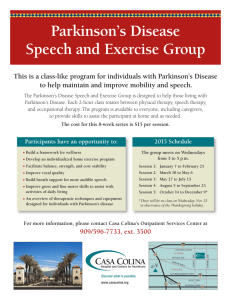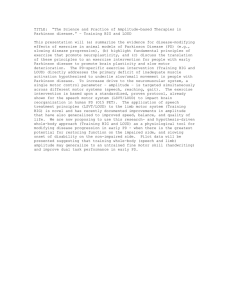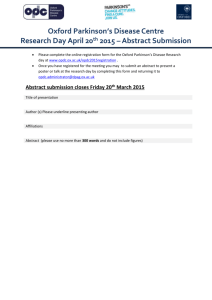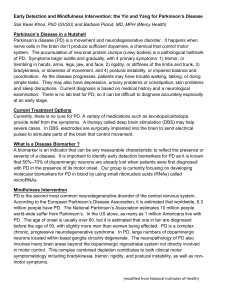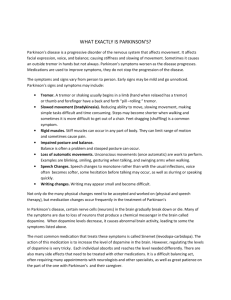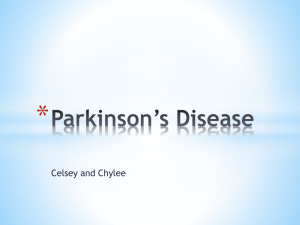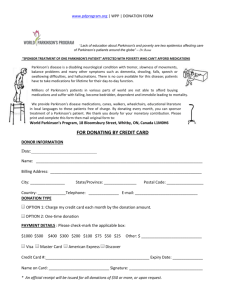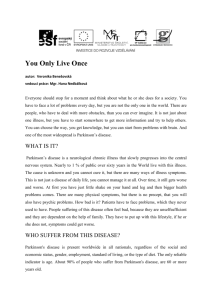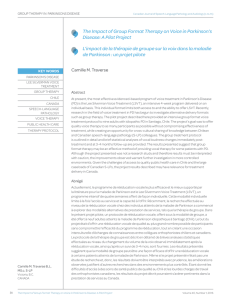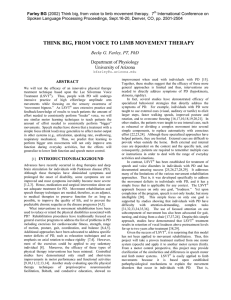Coping with Nervous System Disorders
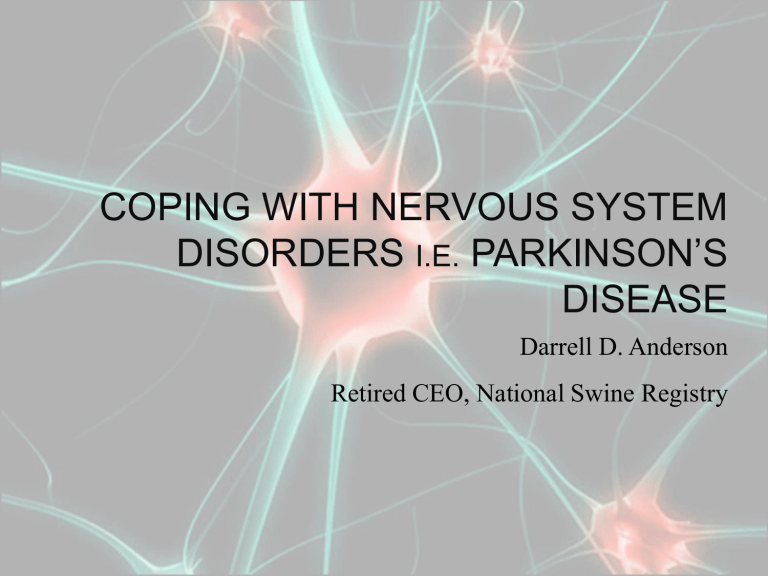
COPING WITH NERVOUS SYSTEM
DISORDERS
I.E.
PARKINSON’S
DISEASE
Darrell D. Anderson
Retired CEO, National Swine Registry
BRIEF BACKGROUND
Born and raised on livestock farm in SW Minn
South Dakota State University – BS Animal Sci
Cottonwood County Extension Director – 5 yrs
Auctioneer for many top llama & alpaca sales
Spent 25 years at AYC/NSR breed associations
Diagnosed with Parkinson Disease - Aug, 2003
Life changed dramatically – family & staff
Ultimately placed on medical leave July, 2011
SO WHAT IS PARKINSON DISEASE?
PD is a complex neurodegenerative disease that affects the central nervous system
Second most common neurodegenerative disease behind
Alzheimer’s Disease
Is not easily diagnosed, as there is no definitive test for it
Affects approximately 1 - 2% of adults over the age of 60
Equally distributed between men & women
Anatomically PD is localized at the base of the brain
Deterioration leads to insufficient production of Dopamine
Electrical signals are disrupted resulting in impairment of the functionality of multiple organs and systems
EARLY DIAGNOSIS ESSENTIAL
Personal example – slight tremor in right hand. Finally agreed to go see a neurologist at the “urging” of my wife
Jokingly told the doctor, “I just wanted to be sure I don’t have Parkinson Disease.”
Twenty minutes later she informed that I did indeed have
Parkinson Disease and my life changed from that moment
Immediate response was one of uncertainty and questions
There were no known genetic ties and often aren’t
Prominent cause of PD is not widely known yet
Is thought to be more prevalent in agricultural industry
SYMPTOMS VARY AND MAY GO
UNRECOGNIZED FOR YEARS
Asymmetric stiffness or weakness of extremities
Tremor at rest of a hand or foot - loss of dexterity
Unsteadiness of gait, rigidity & slowness in movement
Loss of balance
Weakening of voice in both clarity and volume
Chronic and progressive - symptoms always exist and always worsen over time
The rate of progression varies from person to person
Is not fatal - mortality is usually result of secondary complications
COPING WITH ONE SYMPTOM
Auctioneering concerns stemmed from voice weakening
I began researching the web for possible advances in treatment of this particular symptom of PD
Stumbled across the Lee Silverman Voice Treatment
(LSVT) – actually developed at Purdue University
Consulted with PD neurologist – he had heard about it, but knew very little about it
Pursued and discovered the following:
LEE SILVERMAN
VOICE TREATMENT FOR
PARKINSON’S DISEASE
CHARACTERISTICS OF PD
SPEECH
Hypokinetic Dysarthria
Affects both speech and voice
Decreased loudness
Monotone
Breathy voice
Intermittent rapid rushes of speech
Soft consonant production
(Boone & MacFarlane, 2000)
LSVT OVERVIEW
Goal: To teach the patient with PD to improve functional intelligible oral communication by increasing vocal loudness
Method: train high phonatory effort tasks which stimulate increased vocal fold adduction and respiratory support and have an immediate impact on functional intelligible speech
FIVE ESSENTIAL
CONCEPTS OF LSVT
1.
Voice Focus
2.
High Effort
3.
Intensive Treatment
4.
Calibration
5.
Quantification
PERSONAL EXPERIENCE - LSVT
After initial training by Purdue staff, voice clarity and volume improved significantly
Practice, practice, practice proved to yield good results
When devoting daily practice to the techniques, it allowed me to conduct very successful auctions – many four to five hours in duration
But one example of searching out and pursuing relatively little known treatment for one PD symptom
OTHER RAMIFICATIONS OF PD….
When you are diagnosed, your spouse also has the disease
If not careful, depression can become a major issue
Unknown progression of the disease is very concerning
Friends and co-workers may have a variety of reactions to the news of your disease
Quality of life is reduced not only for you but also family members that become care-givers
PERSONAL WORDS OF ADVICE
Early diagnosis is a key to effective treatment
Pursue all possible types of treatments, including LSVT, physical therapy to address strength and balance issues
Be aware of side effects of drugs prescribed for treatment
– many have serious addictive behavioral side effects, etc
Be sensitive to reactions from family, friends & staff
"Instead of giving myself reasons why I can't, I give myself reasons why I can."
FINAL ADVICE FROM THE “SOURCE”
Isaiah 41:10 Fear not, for I am with you; be not dismayed, for I am your
God; I will strengthen you, I will help you, I will uphold you with my righteous right hand
